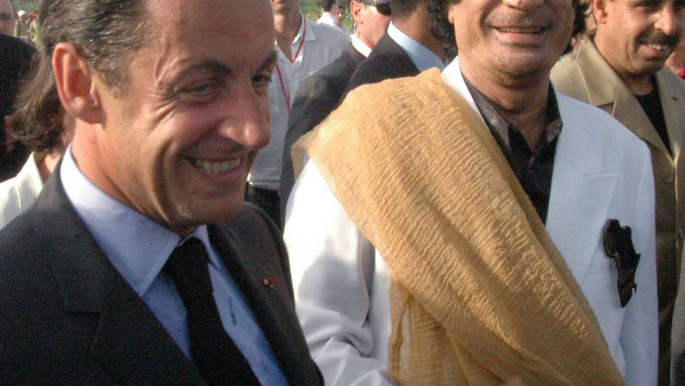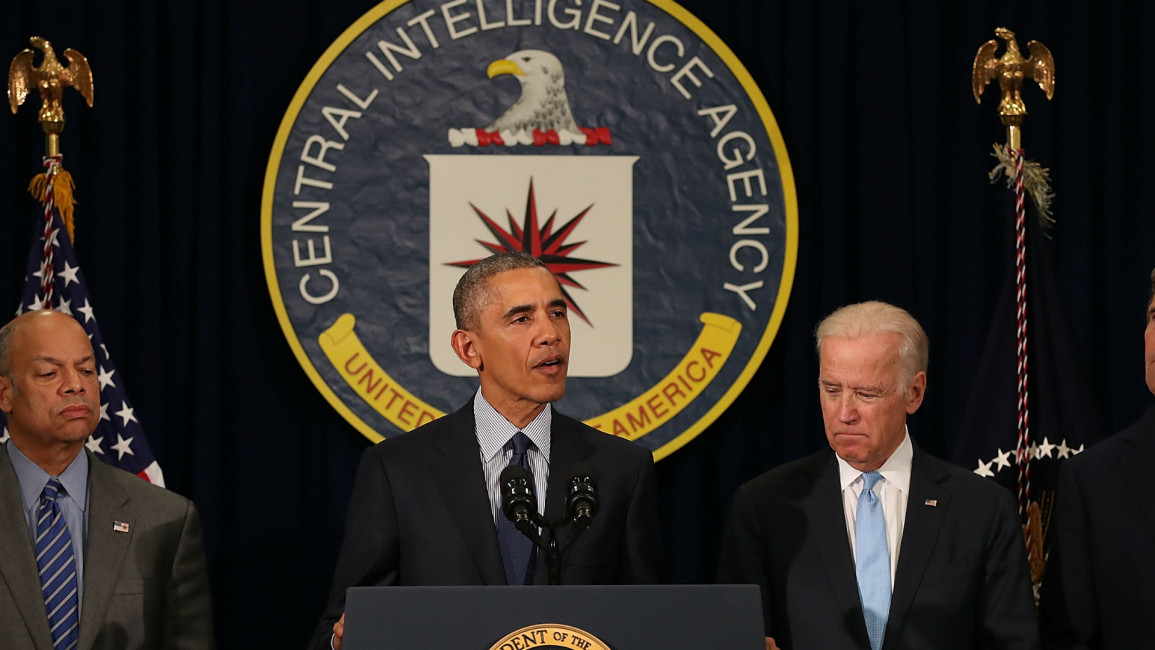Syria focus allows IS growth in Libya, Obama warns
Syria focus allows IS growth in Libya, Obama warns
US President Barack Obama has voiced concerns over militant activity in Libya, days after admitting his administration's failures in the 2011 intervention.
3 min read
Transatlantic anxieties over Libya have mounted in recent months [Getty]
President Barack Obama has warned that efforts to stem the flow of Islamic State [IS] group recruits to Syria and Iraq have allowed militants to flow into Libya unabated.
"As we, and our foreign allies and partners, have made it harder for foreign terrorists to reach Syria and Iraq, we have seen an uptick in the number of IS fighters heading to Libya," the president told reporters at the CIA headquarters in Virginia.
These words followed a review meeting between the commander-in-chief and the intelligence agency concerning US strategy against the IS group.
This warning also comes just days after the president conceded in a Fox News interview that intervention in Libya was perhaps the "worst mistake" of his time in office.
The key error in the decision, Obama said, was his administration's failure "to plan for the day after what I think was the right thing to do in intervening in Libya."
Earlier this week, General David Rodriguez, commander of US Africa command, revealed that according to US intelligence estimates, the number of IS group fighters in Libya has doubled in the past year to around 4,000 to 6,000 recruits.
In recent months, anxieties about US involvement in Libya have mounted, with the outgoing president voicing criticism of his allies who also helped contribute to the country's current crisis.
"You've got Europe and a number of Gulf countries who despise Gaddafi, or are concerned on a humanitarian basis, who are calling for action," Obama told the Atlantic magazine in March.
"But what has been a habit over the last several decades in these circumstances is people pushing us to act but then showing an unwillingness to put any skin in the game... free riders."
In his interview with the monthly publication, the president also expressed his frustration with British Prime Minister David Cameron, who he said was distracted by domestic affairs at the time of the military action.
Former French president Nicolas Sarkozy also fell under Obama's criticism, when the US president described how the latter "wanted to trumpet the flights he was taking in the air campaign, despite the fact that we had wiped out all the air defences and essentially set up the entire infrastructure".
Keeping up the pressure
After his meeting with the CIA on Wednesday, the US leader affirmed his country's committment to tackling the IS group, who he said had lost 28,000 square miles of territory after 11,500 allied airstrikes.
"Today, on the ground in Syria and in Iraq, IS is on the defensive," he said.
"Our 66-member coalition, including Arab partners, is on the offensive. We have momentum, and we intend to keep that momentum."
Libya is currently under the official authority of a unity government in Tripoli headed by Fayez al-Sarraj, however the recently installed administration is struggling to win support from the country's numerous factions.
Since the ouster of Muammar Gaddafi in 2011, Libya has effectively become a failed state, with the country becoming host to an increasing IS group presence.
The militant group has launched numerous attacks in the country, including allegedly having kidnapped 15 Egyptian workers in Tripoli last month.
A UN monitoring report released in March said that the IS group had "significantly expanded" in Libya, warning that the country's collapse had made it an attractive destination for foreign fighters.
"As we, and our foreign allies and partners, have made it harder for foreign terrorists to reach Syria and Iraq, we have seen an uptick in the number of IS fighters heading to Libya," the president told reporters at the CIA headquarters in Virginia.
These words followed a review meeting between the commander-in-chief and the intelligence agency concerning US strategy against the IS group.
This warning also comes just days after the president conceded in a Fox News interview that intervention in Libya was perhaps the "worst mistake" of his time in office.
The key error in the decision, Obama said, was his administration's failure "to plan for the day after what I think was the right thing to do in intervening in Libya."
Earlier this week, General David Rodriguez, commander of US Africa command, revealed that according to US intelligence estimates, the number of IS group fighters in Libya has doubled in the past year to around 4,000 to 6,000 recruits.
In recent months, anxieties about US involvement in Libya have mounted, with the outgoing president voicing criticism of his allies who also helped contribute to the country's current crisis.
"You've got Europe and a number of Gulf countries who despise Gaddafi, or are concerned on a humanitarian basis, who are calling for action," Obama told the Atlantic magazine in March.
"But what has been a habit over the last several decades in these circumstances is people pushing us to act but then showing an unwillingness to put any skin in the game... free riders."
In his interview with the monthly publication, the president also expressed his frustration with British Prime Minister David Cameron, who he said was distracted by domestic affairs at the time of the military action.
 |
|
| Nicolas Sarkozy came under fire from Obama for his role in the 2011 Libya intervention [AFP] |
Keeping up the pressure
After his meeting with the CIA on Wednesday, the US leader affirmed his country's committment to tackling the IS group, who he said had lost 28,000 square miles of territory after 11,500 allied airstrikes.
"Today, on the ground in Syria and in Iraq, IS is on the defensive," he said.
"Our 66-member coalition, including Arab partners, is on the offensive. We have momentum, and we intend to keep that momentum."
Libya is currently under the official authority of a unity government in Tripoli headed by Fayez al-Sarraj, however the recently installed administration is struggling to win support from the country's numerous factions.
Since the ouster of Muammar Gaddafi in 2011, Libya has effectively become a failed state, with the country becoming host to an increasing IS group presence.
The militant group has launched numerous attacks in the country, including allegedly having kidnapped 15 Egyptian workers in Tripoli last month.
A UN monitoring report released in March said that the IS group had "significantly expanded" in Libya, warning that the country's collapse had made it an attractive destination for foreign fighters.

![Trump's warm greeting to Netanyahu contrasted with Kamala Harris's critical reception [Getty]](/sites/default/files/styles/image_212x120/public/2024-07/GettyImages-2162908988.jpg?h=69f2b9d0&itok=uRh_9WXh)
![The brutal assault on Khan Younis has killed dozens and displaced thousands more [Getty]](/sites/default/files/styles/image_330x185/public/2024-07/GettyImages-2162526709.jpg?h=d3eda8cf&itok=n5N-o8p5)
![Members of the Algerian delegation threw roses into the Seine [Getty]](/sites/default/files/styles/image_330x185/public/2024-07/GettyImages-2162980872.jpg?h=199d8c1f&itok=h_3o_TOL)